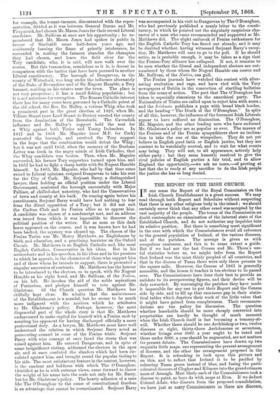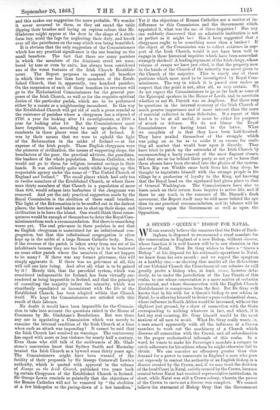THE REPORT ON THE IRISH CHURCH.
IN one sense the Report of the Royal Commission on the Irish Church Establishment is a great success. We may read through both Report and Schedules without suspecting that there is any other religious body in the island ; we should certainly never think that any other creed was accepted by the vast majority of the people. The terms of the Commission no doubt contemplate an examination of the internal state of the Established Church, and do not authorize any inquiries into its relative position. But there is something most significant in the care with which the Commissioners avoid all reference to the general population of Ireland, of the various dioceses, and of the parishes. The acreage is given us with scrupulous exactness, and this is to some extent a guide. But if we had not the last Census and Mr. Thona's use- ful statistics before us, we might infer from the Report that Ireland was the most thinly peopled of all countries, and that in the diocese of Tuam there were only three persons to the square mile. However, the Census of 1861 is generally accessible, and the lesson it teaches is too obvious to be passed over. The Commissioners have done their best to provide an antidote to its overpowering figures, and their device will be duly rewarded. By rearranging the parishes they have made it impossible for any one to put their Report and the Census side by side, and to fill up that enormous gap in their statis- tical tables which deprives their work of the little value that it might have gained from completeness. Their recommen- dations are too paltry for discussion. The question whether leaseholds should be more cheaply converted into perpetuities can hardly be thought of much moment when the Irish Church itself is fast becoming a tenancy-at- will. Whether there should be one Archbishop or two, twelve dioceses or eight, thirty-three Archdeacons or seventeen, whether livings over 300/. a year ought to be taxed and those under 300/. a year should be augmented, are not matters for present debate. The Commissioners have drawn up two exquisite little maps, one representing the present arrangement of dioceses, and the other the arrangement proposed in the Report. It is refreshing to look upon this picture and on this, and to reflect that Ireland is to be pacified by colouring Tuam green instead of blue, and fusing the parti- coloured dioceses of Clogher and Kilmore into the grand crimson mass of Armagh. Most likely each of the Commissioners took a diocese to paint, as boys do with maps at Eton. If we deduct Colonel Adair, who dissents from the proposed consolidation, we have just as many Commissioners as there are dioceses,
and this makes our suggestion the more probable. We wonder it never occurred to them, as they sat round the table dipping their brushes and laying on copious colour, that Mr. Gladstone might appear at the door in the shape of a sixth- form boy, scold the fags for neglecting their duty, and knock over all the paintboxes on the map which was being beautified. It is obvious that the only suggestion of the Commissioners which has any practical significance is the one bearing on the small benefices. The fact that there are many parishes in which the members of the dominant creed are num- bered by tens or even by units, has always been considered one of the worst features of the Irish Church Establish- ment. The Report proposes to suspend all benefices in which there are less than forty members of the Estab- lished Church, that is, apparently, two hundred parishes. On the suspension of each of these benefices its revenues will go to the Ecclesiastical Commissioners for the general pur- poses of the Irish Church, as well as for the requisite spiritual duties of the particular parish, which are to be performed either by a curate or a neighbouring incumbent. In this way the Established Church will get rid of such a gross scandal as the existence of parishes where a clergyman has a stipend of 270/. a year for looking after 14 co-religionists, or 2201. a year for looking after 10. But the Commissioners must have forgotten that, according to many speakers, the in- cumbents in these places were the salt of Ireland. It was by their means that we were to uphold the light of the Reformation in the midst of Ireland — at the expense of the Irish people. These English clergymen were the pioneers of civilization, the means of supporting shops, the benefactors of the poor, the practical advisers, the guardians, the bankers of the whole population. Roman Catholics, who would not go to them for religion, invested savings in their hands. It was evidently quite worth while keeping up this respectable agency under the name of "The United Church of England and Ireland." The small places which had only ten or twelve members of the Established Church, or where there were thirty members of that Church in a population of more than 600, would relapse into barbarism if the clergyman was removed. And yet the only practical suggestion made by the Royal Commission is the abolition of these small benefices. The light of the Reformation is to be snuffed out in the darkest places, the butchers and bakers are to shut up their shops, and civilization is to leave the island. One would think these conse- quences would be enough of themselves to deter the Royal Corn- missionersfrom such a recommendation. But there is something worse yet. The real grievance in these parishes is not that an English clergyman is maintained for an infinitesimal con- gregation, but that this infinitesimal congregation is often kept up in the midst of a large Roman Catholic body. Now, if the revenue of the parish is taken away from one set of its inhabitants because they are too few, why is it to be bestowed on some other parish where the members of that set happen to be many ? If there was any former grievance, this will simply aggravate it. If there was no grievance at all, this will call one into being. And after all, what is to be gained by it ? Merely this, that the parochial system, which was considered indispensable for Ireland, has been virtually sur- rendered as being impossible in Ireland, and that the principle of consulting the majority before the minority, which was steadfastly repudiated as inconsistent with the life of the Established Church, has been adopted within that Church itself. We hope the Commissioners are satisfied with this result of their labours.
No doubt it would have been impossible for the Commis- sion to take into account the questions raised in the House of Commons by Mr. Gladstone's Resolutions. But was there any use in appointing a Commission which was merely to examine the internal condition of the Irish Church at a time when such an attack was impending ? It cannot be said that the Irish Church had received no warnings. The controversy has raged with more or less violence for nearly half a century. Even those who still talk of the suddenness of Mr. Glad- stone's conversion know that Sydney Smith and Macaulay treated the Irish Church as a byword some thirty years ago. The Commissioners might have been warned of the futility of their proposals by Sir George Cornewall Lewis's authority, which is quoted with approval in the volume of Essays on the Irish Church, published two years back b3z, certain Clergymen of the Established Church in Ireland. Sir George Lewis reminds us pointedly that the objections of the Roman Catholics will not be removed by "the abolition of a few bishoprics or the paring-down of a few benefices."
Yet if the objections of Roman Catholics are a matter of in- difference to this Commission and the Government which appointed it, what was the use of these inquiries ? Has any one suddenly discovered that an admirable institution is not as perfect as it might be ? Has it been suggested that a clergyman ought to be something more than a banker? If the object of the Commission was to collect evidence in sup- port of the Irish Church, would it not have been well to engage in those historical inquiries which have been somewhat strangely shirked? A leading argument of the Irish clergy, whose volume of essays we have just cited, is that the property now in the hands of the Church of the minority was never given to the Church of the majority. This is surely one of those positions which most need to be investigated by Royal Com- missioners. The way in which it is passed over makes us suspect that the point is not, after all, so very certain. We do not expect the Commissioners to go so far back as some of the Episcopal speakers in the House of Lords, and to ascertain whether or not St. Patrick was an Anglican. But there may be questions in the internal economy of the Irish Church of much greater importance and of more interest than the mass of material collected in these Schedules. If a report of this kind is to be at all useful, it must be either for purposes of attack or defence. We do not blame the Royal Commissioners for having leant to the latter. What we complain of is that they have been half-hearted. They have availed themselves of the struggle which was going on so far as to make it an excuse for omit- ting all matter that would bear upon it directly. They have tried to patch up the outworks of the Irish Church by recommending a hasty removal of the most flagrant abuses, and they are so far behind their party as not yet to know that these abuses have been elevated into the glories of the system. When Rip van Winkle came back from his long sleep, he thought to ingratiate himself with the strange people in his village by a profession of loyalty to the King, not knowing that the Royal head on the signboard had given place to that of General Washington. The Commissioners have also to learn much on their return from inquiry to active life, and if there be any truth in the rumours of Mr. Disraeli's flank movement, the Report itself may be still more behind the age than its one practical recommendation, and its labours will be thrown away upon the Government as well as upon the Opposition.































 Previous page
Previous page